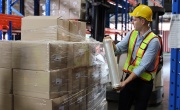Amur Yorkshire AD plant gains PAS 110 standard
Anaerobic digestion (AD) operator Amur has gained the PAS 110 standard for digestate produced at its Yorkshire facility.
Amur, part of AB Agri, began proceedings to gain its PAS 110 accreditation in January 2018 for its plant east of Leeds, which processes around 60,000 tonnes of blended food and green waste, with the new accreditation providing assurance of the quality of Amur’s product.
The PAS 110 is a quality framework for digestate that allows it to be classed as a quality product rather than a waste; it is administered by the Biofertiliser Association and accredited by the British Standards Institute.
It restricts plants from taking in certain types of waste and requires operators to test outputs at regular intervals. Auditors expect plant operators to test feedstocks, monitor areas such as retention time and the health of the digester, and to take samples of digestate. In July 2018, Amur unveiled its rapid feedstock test, which analyses AD inputs to ensure they are safe and free from toxins, returning results in 24 hours.
Amur’s Operations Manager, Charlie Thompson, said: “Meeting the requirements of the standard demonstrates that we are committed to following best practice procedures and producing quality outputs. As well as opening up new markets for our digestate, it also guarantees that our specially-blended food waste soup is a suitable feedstock for other PAS 110-accredited plants.
“We were already working to many of the PAS 110 standards, such as monitoring digestate and taking monthly samples. Once we started the process, we ensured that all staff and contractors were trained and understood the importance of adhering to PAS 110 procedures.”
Read more: Getting more out of anaerobic digestion
Thompson added: “Committing to a quality standard such as PAS 110 is a perfect fit for a business like Amur. Digestate is not given the credit it deserves. The negative carbon impact of chemical fertiliser is well documented and digestate offers a sustainable alternative that comes with added cost benefits. Taking food waste and processing it to generate a quality product – that is not classed as a waste – meets our objectives as a circular business, but it also shows the other AD operators that we support that our systems and processes are robust and well-managed.”






